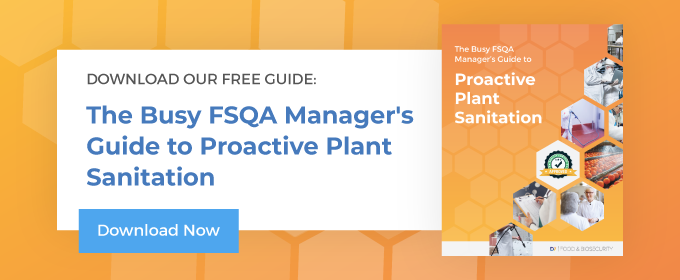In a recent case study, we discussed the successful removal of biofilm* from a clean-in-place system at a major ready-to-eat food manufacturer’s facility.Not only did the deep cleaning process remove the biofilm the facility had been battling in its pipelines, but it also helped increase production because pipeline capacity was increased by 42 percent. This is an excellent example of why a preventive approach is typically better than a reactive one. Rather than waiting for an outbreak to occur, the food processing companies that have measures in place to avoid them are also likely to reap other benefits.
*Disclaimer: Review D7 product label before use
This Situation is Not Unique
Unfortunately, this company is not the only food manufacturer that faces challenges with Listeria and other bacteria. According to the CDC, approximately 1,600 people each year become ill from exposure to Listeria, and about 16 percent of those cases result in death. E. coli, another common bacteria found in food, is responsible for an estimated 265,000 STEC infections each year in the United States. The CDC estimates that Salmonella is linked to 1.2 million illnesses and 450 deaths each year, with food sources being the cause of about one million of these cases.
Consumers are not the only parties who are impacted by outbreaks in the food processing industry. Food Safety Magazine reported a total of 382 food product recalls in 2018. Of those, 70 were linked to Listeria, 67 were due to Salmonella, and 16 were caused by E. coli. All of these recalls were significant financial events for the companies involved, and perhaps more damaging to a food brand is the lasting harm that can result from a recall.
Of course, deep cleaning is the clear solution when an outbreak occurs or when a persistent biofilm is discovered. However, investing in proactive measures to reduce bacteria to safe levels on a daily basis can help prevent this type of situation from occurring in the first place. As this company learned, the benefits of Decon7 go beyond just one-time disinfecting. They also include daily sanitation that helps remove biofilms and prevent costly outbreaks from occurring.
Bacteria is Not Going Away
Bacteria is a reality that all food processors must face, and this is not going to change. It presents major challenges to food safety, especially when biofilms are able to form. Effectively removing biofilms throughout an entire facility, on both production surfaces and inside equipment and pipelines, significantly reduces the risk of an outbreak. Maintaining an environment that makes it difficult for biofilms to form will help protect both your customers and your brand.
Additional Benefits of a Proactive Approach
Another key lesson learned from this case study is that being proactive delivers multiple benefits that go beyond food safety. Had the company been using D7 on a regular basis, its pipelines would have been cleaner and production would have been faster.
The company had also been losing a lot of product through its quality control processes. Any time questionable product came off the line, the company had to dispose of it. While it’s certainly good that those systems were working, a better scenario is one in which bacteria doesn’t have an opportunity to get into the product in the first place. With regular sanitation using D7, the company would have wasted less product, and the quality would have been more consistent.
Why wait until there is a problem to get the benefits of using D7 on your production areas and in your CIP systems? Read the case study to learn more about how we helped a major food manufacturer remove biofilms from its clean-in-place systems and other areas throughout its facilities.
If you are addressing a persistent bacteria in your food processing facility, see what the Decon7 team can do for you. A company that was once skeptical of the science has seen D7 in action and is now incorporating it into maintenance plans at affiliated operations across the world.

